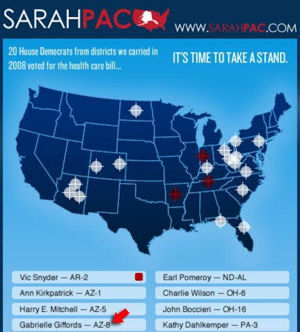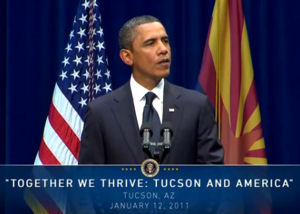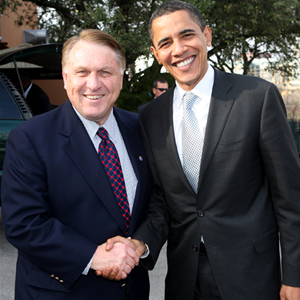Violent Rhetoric & Civil Discourse: Democrats vs. the Tea Party
 | | Did she honestly expect to get questions from Fox News about how horrible the Tea Party is? |
"Really Gretchen?" blurted a frustrated DNC chairwoman Debbie Wasserman Schultz on FOX & Friends this morning, "How many times have you called out the coarse language at tea party rallies? Almost never." She was being pressed by host Gretchen Carlson to respond to inflammatory comments made by Teamsters President James Hoffa at a political rally yesterday, during which Hoffa claimed that the Tea Party was declaring war on workers and that the Democratic Party needed to raise an army to "take these sons of bitches out." The president, who spoke immediately after Hoffa (and said he was "proud" of him), has declined to comment, and Schultz' reply is a familiar one coming from the left today. Many Democrats seem to think it hypocritical for people on the right to condemn Hoffa while ignoring similar rhetoric coming from the Tea Party.
Perhaps they are right, but I don't remember any member of the Tea Party getting in front of a national audience and calling for a more civil tone in modern political discourse. Schultz and those like her are missing the point. This isn't about Hoffa or what he said (any politically-minded person in this country has to deal with far worse than that from political opponents); this is about the Democratic Party and President Obama's reluctance to condemn the violent rhetoric, because they have been ignoring plenty of violent rhetoric from the left while consistently condemning it from the right as being inappropriate.
 | | I didn't want to share this picture, because just looking at it makes you want to shoot Democrats, apparently |
To be clear, I am not calling for more civil political discourse. I am aware that such a dream is unattainable, even though I believe intellectually honest people can have reasonable debates with each other when they don't resort to name-calling or violent imagery. Therefore, you cannot claim that it is hypocritical for me to talk about this, because I don't care about what Hoffa said, just like I don't care that Sarah Palin once used crosshairs in a political advertisement. I only care about the hypocrisy of those on the left--especially the president--for arguing that such imagery and rhetoric is beyond the pale, but only when it comes from the right. Sure, as a supporter of the Tea Party, I am sick of being called a "teabagger" and a racist, but I wouldn't be surprised to learn that, in a weak moment, I've resorted to calling those who disagree with me names. I'm not proud of it, but I'm not going to ignore the fact that I am a human being. Still, if the president is going to lecture us about being civil, he needs to practice what he preaches so that it doesn't become an empty, meaningless platitude.
On January 12 of this year, after Gabrielle Giffords was shot, the President said:
But at a time when our discourse has become so sharply polarized-Ėat a time when we are far too eager to lay the blame for all that ails the world at the feet of those who happen to think differently than we do-Ėitís important for us to pause for a moment and make sure that weíre talking with each other in a way that heals, not in a way that wounds...
As we discuss these issues, let each of us do so with a good dose of humility. Rather than pointing fingers or assigning blame, letís use this occasion to expand our moral imaginations, to listen to each other more carefully, to sharpen our instincts for empathy and remind ourselves of all the ways that our hopes and dreams are bound together...
We should be civil because we want to live up to the example of public servants like John Roll and Gabby Giffords, who knew first and foremost that we are all Americans, and that we can question each otherís ideas without questioning each otherís love of country and that our task, working together, is to constantly widen the circle of our concern so that we bequeath the American Dream to future generations.
They believed, and I believe that we can be better. Those who died here, those who saved life hereĖ-they help me believe. We may not be able to stop all evil in the world, but I know that how we treat one another, thatís entirely up to us.
 | | President Obama in Tucson |
This was hardly a new stance from President Obama. Just two months earlier, he said:
Weíre going to need to be strong and weíre going to need to be united. None of the challenges we face lend themselves to simple solutions or bumper-sticker slogans. Nor are the answers found in any one particular philosophy or ideology. As Iíve said before, no person, no party, has a monopoly on wisdom. And thatís why Iím eager to hear good ideas wherever they come from, whoever proposes them. And thatís why I believe itís important to have an honest and civil debate about the choices that we face. Thatís why I want to engage both Democrats and Republicans in serious conversations about where weíre going as a nation.
These are fine words and an admirable position to take. These are also not the only examples I have come across of the president telling a national audience to be more civil or bipartisan when discussing politics. Though I'm too cynical to believe that the goals outlined are achievable, I do agree with the sentiment and would be thrilled if our president could take the lead and stand above the partisan mudslinging. Of course, next year is an election year, so I don't really expect it to happen.
And, to stay on message, it hasn't happened yet. Shrill politics is nothing new--it's an unavoidable side effect of democracy and free speech--but it definitely seems to have been ratcheted up in the last few years, starting with the most recent Bush administration. Surely I don't need to give examples of inflammatory things said about that administration, the Patriot Act, or the wars in Iraq and Afghanistan, nor do I really need to talk about all the ridiculous accusations made about the patriotism of Bush's naysayers, most notably 2004's Democratic presidential nominee, John Kerry. Barack Obama was raised to high office in part because he promised to rise above the vitriole and animosity of the Bush years, and yet, since he's been in office, it doesn't seem to have been toned down at all.
 | | Ah, the good old days |
It's certainly not the president's fault. Assigning real blame for the phenomenon would be futile, because there are dozens of different things that have contributed to it, including the rise of 24-hour-news networks, the increasing availability of the Internet, and the stress of the times we live in. There is plenty of outlandish, provocative, and overzealous political rhetoric out there, coming from all sides and all angles. No one political party or cultural meme is to blame. It's fair to complain about bias, if you must, coming from Fox News or The New York Times, talk radio or Hollywood, etc., but it's not intellectually honest to claim that any one entity is more guilty than all the others.
This is why the president's goal is so hard to achieve. If you're going to call for civil discourse, you have to be willing to chide uncivil words coming from all sides, even from people you tend to agree with. You have to call out people on the right for their violent imagery and mean-spirited name-calling, while you simultaneously condemn it when it comes from the left. The president has failed to do this.
Need examples? Here are a few, just from the last month. When there were legislative problems with FAA funding following the contentious debt ceiling debate, an annoyed Senator Chuck Schumer and other Democratic leaders accused the Tea Party of "hostage taking" and "putting a gun to [their] heads." On August 1, Democratic leaders reportedly refered to Congressional Tea Party members as "terrorists." On August 20, Democratic Congresswoman Maxine Waters said that "the Tea Party can go straight to Hell."
James Hoffa's comments yesterday are really just more of the same. What he said was:
We got to keep an eye on the battle that we face: The war on workers. And you see it everywhere. It is the Tea Party. And you know, there is only one way to beat and win that war. The one thing about working people is we like a good fight. And you know what? Theyíve got a war, they got a war with us and thereís only going to be one winner. Itís going to be the workers of Michigan, and America. Weíre going to win that war. President Obama, this is your army. We are ready to march...Everybody hereís got a vote...Letís take these sons of bitches out and give America back to an America where we belong.
 | | I wonder why the White House would be so reluctant to poo-poo the words of a powerful union leader like Hoffa... |
You can certainly play semantics and argue that "take these sons of bitches out" means nothing more than voting them out of office, but if that were the case, why the talk of wars, fighting, marching, and armies? Also, Hoffa wasn't just talking about Tea Party leaders; he specifically says that "it is the Tea Party," and that "you see it everywhere." No, splitting hairs isn't going to exonerate Hoffa of using violent rhetoric. Similarly, arguing that congressional Tea Party leaders really were acting like "hostage takers" doesn't mean it's okay to use such imagery in public discourse. After all, if Sarah Palin's use of crosshairs on a map is damnable enough to condemn, so is arguing that the Tea Party is holding a gun to your head.
So until President Obama, Debbie Wasserman Schultz, Joe Biden, and/or other top Democrats come forward and start condemning all this violent rhetoric against the Tea Party, I don't want to hear one more word about "civil discourse." Until Democrats stop using words like "racists," "teabaggers," and "hostage-takers" and start actually engaging the other side in the substantive issues with honest debate, I don't want to hear them bitch and moan about bad things being said at Tea Party rallies. We can either agree to ignore the inflammatory rhetoric, or we can start condemning it on all sides. I'm sorry for all of you hoping to badger your political opponents into submission without having to censor yourselves, but there's no middle ground here.
-e. magill 9/6/2011
|
|